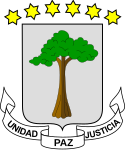2022 Equatorial Guinean general election
This article may be expanded with text translated from the corresponding article in French. (March 2022) Click [show] for important translation instructions.
|
| |||||||||||||
|
| |||||||||||||
Presidential election | |||||||||||||
| |||||||||||||
| |||||||||||||
 |
|---|
General elections will be held in Equatorial Guinea on 20 November 2022 to elect the President and members of Parliament, alongside local elections. Originally the parliamentary elections had been scheduled for November 2022 and presidential elections for 2023. However, in September 2022 Parliament approved a proposal to merge the elections due to economic constraints.[1]
Background
After becoming independent from Spain in 1968, Equatorial Guinea was ruled by President for life Francisco Macías Nguema until he was overthrown in a coup in 1979 by his nephew Teodoro Obiang Nguema Mbasogo, who has served as the country's president since. Both have widely been characterised as corrupt dictators.[2][3][4]
Equatorial Guinea's government is authoritarian and has one of the worst human rights records in the world, consistently ranking among the "worst of the worst" in Freedom House's annual survey of political and civil rights.[5] Reporters Without Borders ranks President Obiang among its "predators" of press freedom.[6]
Political opposition, though nominally allowed alongside a nominal multi-party system, is effectively nonexistent, with President Obiang loyalists holding nearly all seats in the legislature since his installation as leader.[7] No election has been described as free or fair in the country. Human Rights Watch and Amnesty International among other non-governmental organizations have documented severe human rights abuses including illegal detention, with prisoners subjected to tactics including torture and beatings. Unexplained deaths have also been reported.[8][9][10]
Electoral system
The president is elected using the first-past-the-post system.[11]
The 100 members of the Chamber of Deputies are elected by closed-list proportional representation from multi-member constituencies based on the 19 electoral districts with an electoral threshold of 10%.[12][13] Of the 70 members of the Senate, 55 are elected from the same 19 electoral districts also by closed-list proportional representation and with an electoral threshold of 10%. An additional 15 members are appointed.[14]
Presidential candidates
On Friday, 14 October, the National Electoral Commission (CEN) announced all the candidates who will participate the November elections. For the presidential election, there were three candidates including incumbent President Obiang.[15]
Obiang was elected as the presidential candidate of the ruling Democratic Party of Equatorial Guinea (PDGE) at a party convention on 23 September. Obiang's eldest son, incumbent Vice President Teodorin Nguema Obiang, had previously sought the party's nomination. The Africa Report describes the compromise that was reached whereby Obiang would seek re-election and then step down after some years, allowing Teodorin to complete the term before facing election.[16]
Buenaventura Monsuy Asumu, a sitting Senator who has run in the previous three elections, is the candidate of the Party of the Social Democratic Coalition (PCSD). The PCSD is allied with the ruling PDGE for the legislative and municipal elections.[17]
Andrés Esono Ondó of the Convergence for Social Democracy (CPDS) party is the sole opposition candidate. He is participating for the first time.[15]
References
- ^ "Equatorial Guinea approves November election", BBC News, 8 September 2022
- ^ "Equatorial Guinea country profile". BBC News. 8 May 2018.
- ^ Simon, Allison (11 July 2014). "Equatorial Guinea: One man's fight against dictatorship". The Guardian. Retrieved 9 May 2017.
- ^ "Equatorial Guinea: Ignorance worth fistfuls of dollars". Freedom House. 13 June 2012. Archived from the original on 23 June 2012. Retrieved 19 January 2017.
- ^ Worst of the Worst 2010. The World's Most Repressive Societies. freedomhouse.org
- ^ Equatorial Guinea – Reporters Without Borders Archived 15 October 2010 at the Wayback Machine. En.rsf.org. Retrieved on 5 May 2013.
- ^ "Equatorial Guinea, one dictatorship to the next". November 2021.
- ^ Equatorial Guinea. Amnesty International. Retrieved on 5 May 2013. Archived 1 November 2014 at the Wayback Machine
- ^ Equatorial Guinea. Human Rights Watch. Retrieved on 5 May 2013.
- ^ Freedom House. "Equatorial Guinea: Freedom in the World 2022". freedomhouse.org. Retrieved 2 April 2022.
- ^ "Equatorial Guinea's iron fisted leader set for re election". News24.
- ^ "Decreto Presidencial por el que se disuelve la Cámara de los Diputados, el Senado y los Ayuntamientos y se convoca elecciones generales para la Cámara de los Diputados, el Senado y Municipales" (PDF) (in Spanish). Government of Equatorial Guinea. 15 September 2017. Archived from the original (PDF) on 26 September 2017.
- ^ Chamber of Deputies: Electoral system IPU
- ^ Senate: Electoral system IPU
- ^ a b "Equatorial Guinea: two candidates against Teodoro Obiang in presidential election". Africanews. 17 October 2022. Retrieved 31 October 2022.
- ^ "Equatorial Guinea: The Obiang family's secret agreement over the presidential election". The Africa Report.com. 29 September 2022. Retrieved 31 October 2022.
- ^ Manga, Linda (20 October 2022). "Présidentielle 2022 : Buenaventura Monsuy Asumu dépose à nouveau sa candidature". Jornal de Malabo (in French).
- Webarchive template wayback links
- CS1 Spanish-language sources (es)
- CS1 French-language sources (fr)
- Articles with short description
- Short description with empty Wikidata description
- Use dmy dates from September 2022
- Articles needing translation from French Wikipedia
- Pages with no translate target
- Pages using embedded infobox templates with the title parameter
- 2022 elections in Africa
- 2022 in Equatorial Guinea
- November 2022 events in Africa
- Future elections in Africa
- Legislative elections in Equatorial Guinea
- Presidential elections in Equatorial Guinea
- All stub articles
- African election stubs
- Equatorial Guinea stubs

